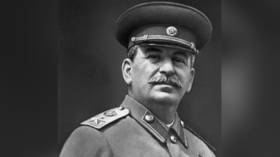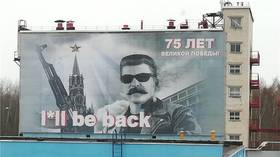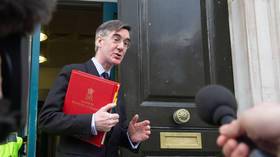'Make it a national holiday of LIBERATION': Russian activists celebrate anniversary of Stalin's death

Joseph Stalin’s legacy divides Russian and broader post-Soviet society. While Putin has condemned the Soviet dictator’s repressions, the Communist Party still regards him as an icon and others celebrate his role in WWII.
Now a group of activists in Russia’s fourth-largest city plans to celebrate the anniversary of Stalin’s death with fireworks. Thursday marks the 67th anniversary of the Georgian strongman’s demise. The ‘celebrations’ will begin around 8pm, after it gets dark in Ekaterinburg.
"The most terrible period of bloody repressions was under Stalin [and it] should not be forgotten," their spokesperson told Urals-based news outlet Znak. "Not a single tyrant has killed so many people, and the day of his death should become a national holiday of liberation – [because] if this hadn't happened, the number of victims would be much higher."
"We hope that other cities will join us next year," they added. The members of the group expressed a desire to stay anonymous, as they fear harassment from Stalin supporters.
The autocrat died on March 5, 1953 at his official residence, the Kuntsevo Dacha, outside Moscow. The official cause of death was a brain hemorrhage.
On the anniversary, it's customary for members of the Communist Party to hold commemorative events. In Moscow, flowers were laid at his burial place near the Kremlin wall on Thursday. Similar ceremonies happen in some other places around the country, but they are the exception rather than the rule.
Russia is full of Lenin busts, but you very rarely see one of Stalin. Here in Penza, there’s a golden bust of the ‘Generalissimo,’ outside the local Communist Party headquarters - or the ‘Stalin Centre.’ Today, exactly 67 years after he died, the bust has fresh red flowers. pic.twitter.com/lQmBYZJmFq
— Jonny Tickle (@jonnytickle) March 5, 2020
In October 2017, Vladimir Putin unveiled a 30-meter long memorial in downtown Moscow to Stalin's victims and others who endured Soviet repression, known as the "Wall of Grief."
"Millions of people were branded as enemies of the people, were executed or crippled, underwent torture in prisons and forced deportations," he said. "This terrible past cannot be erased from the national memory. And certainly cannot be justified by whatever imaginary greater good of the people."
Putin was clear that, unlike some other episodes in Russia's past that are the subject of heated public discourse, Stalin's outrages were not up for debate. "It was about death and suffering of millions. One should only visit… mass graves of the victims, which are many in Russia, to realize that there is no justification for those crimes," he continued.
"The persecution campaign was a tragedy for our people, our society, a ruthless blow to our culture, roots, and identity. We can feel the consequences now and our duty is not to allow it to be forgotten."
Historians disagree on the numbers who suffered under Stalin. The human rights society, Memorial, believes that a minimum of 12 million people died during the state terror he unleashed, while the Gulag History Museum says about 20 million people passed through the notorious camps.
Also on rt.com Putin says nothing can justify political persecution as Russia commemorates Stalin victimsThink your friends would be interested? Share this story!















